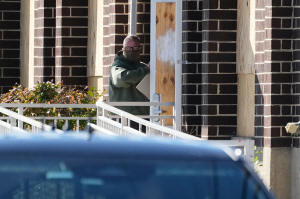With Supreme Court decision still pending, judge extends block on Guard
in Chicago indefinitely
[October 23, 2025]
By CHRISTINE FERNANDO and GENE JOHNSON
CHICAGO (AP) — National Guard troops won't be deploying in the Chicago
area anytime soon unless the U.S. Supreme Court intervenes because a
judge on Wednesday extended her temporary restraining order
indefinitely.
Elsewhere around the country, it will be at least days before the Guard
could be deployed in Portland, Oregon, and federal appeals judges are
weighing whether hundreds of California National Guard members should
remain under federal control.
President Donald Trump’s push to send the military into Democratic-run
cities despite fierce resistance from mayors and governors has unleashed
a whirlwind of lawsuits and overlapping court rulings.
Here's what to know about legal efforts to block or deploy the National
Guard in various cities:
Judge weighs Guard in Chicago while awaiting Supreme Court decision
U.S. District Judge April Perry on Wednesday blocked the deployment of
Guard troops to the Chicago area until the case has been decided either
in her court or the U.S. Supreme Court intervenes. Perry had already
blocked the deployment for two weeks through a temporary restraining
order, or TRO.
Attorneys representing the federal government said they would agree to
extend the order but emphasized that they would continue pressing for an
emergency order from the Supreme Court that would allow for the
deployment.
“Every day this improper TRO remains in effect imposes grievous and
irreparable harm on the Executive,” Solicitor General D. John Sauer
wrote in a Supreme Court filing Tuesday.
Lawyers representing Chicago and Illinois have asked the Supreme Court
to continue to block the deployment, calling it a “dramatic step.”

Guard deployment in Portland also in limbo
An appeals court said Monday that Trump could take command of 200 Oregon
National Guard troops, but a separate court order still blocks him from
actually deploying them.
U.S. District Judge Karin Immergut, a Trump appointee, issued two
temporary restraining orders earlier this month. One prohibited Trump
from calling up Oregon troops so he could send them to Portland. The
other prohibited him from sending any Guard members to Oregon at all
after he tried to evade the first order by deploying California troops
instead.
The Justice Department appealed the first order and — in a 2-1 ruling
Monday — a 9th U.S. Circuit Court of Appeals panel sided with the
administration.
However, Immergut’s second order remains in effect, so no troops may
immediately be deployed. She has scheduled a hearing for Friday on the
administration's request to dissolve that order. Meanwhile, the state is
asking the 9th Circuit to reconsider Monday's ruling.
California legal battle goes before appellate panel
A 9th U.S. Circuit Court of Appeals panel in Pasadena heard arguments
Wednesday related to Trump’s deployment of Guard troops to Los Angeles.
[to top of second column]
|

A Federal agent walks into an ICE processing facility in the Chicago
suburb of Broadview, Ill., Tuesday, Oct. 21, 2025. (AP Photo/Nam Y.
Huh)

A district court found the administration violated federal law when
it sent troops to Los Angeles in June after protests over Trump's
immigration crackdown.
Judge Charles Breyer handed California Gov. Gavin Newsom a victory
on June 13 when he ordered control of California's Guard members
back to the state. But in an emergency ruling, an appeals court
panel sided with the Trump administration, putting Breyer's decision
on hold and allowing the troops to remain in federal hands as the
lawsuit unfolds.
The appeals court is now weighing whether to vacate Breyer’s June
order.
The same three-judge panel is also handling the Trump
administration’s appeal of Breyer's Sept. 2 ruling, which found the
president violated the Posse Comitatus Act, an 1878 law prohibiting
military enforcement of domestic laws.
Groups aim to stop Guard deployment in DC
In Charleston, West Virginia, a state court hearing is set for
Friday in a lawsuit filed by two groups seeking to block deployment
of the state National Guard to Washington, D.C. More than 300 Guard
members have been in the nation’s capital supporting Trump’s
initiative since late August.
A separate federal court hearing centers on a request by District of
Columbia Attorney General Brian Scwalb for a temporary injunction to
stop the deployments of more than 2,000 guardsmen.
Forty-five states have entered filings in that case, with 23
supporting the administration’s actions in D.C. and 22 supporting
the attorney general’s lawsuit.
Republican governors from several states also sent units to D.C.
Although the emergency period ended in September, more than 2,200
troops remain. Several states told The Associated Press they would
bring their units home by Nov. 30, unless extended.
Democrats sue to stop Guard deployment in Memphis
In Tennessee, Democratic elected officials sued last Friday to stop
the ongoing Guard deployment in Memphis. They said Republican Gov.
Bill Lee, acting on a request from Trump, violated the state
constitution, which says the Guard can be called up during
“rebellion or invasion” — but only with state lawmakers' blessing.
Since their arrival on Oct. 10, troops have been patrolling downtown
Memphis, including near the iconic Pyramid, wearing fatigues and
protective vests that say “military police,” with guns in holsters.
Guard members have no arrest power, officials have said.
___
Johnson reported from Seattle. Associated Press writers Mark Sherman
in Washington, D.C., Olga R. Rodríguez in San Francisco, Adrian
Sainz in Memphis, and John Raby in Charleston, West Virginia
contributed to this report.
All contents © copyright 2025 Associated Press. All rights reserved |